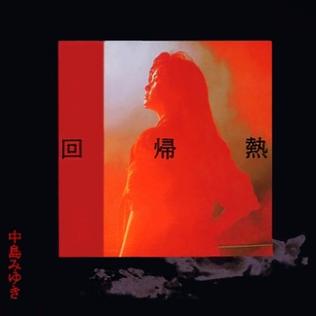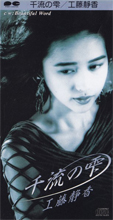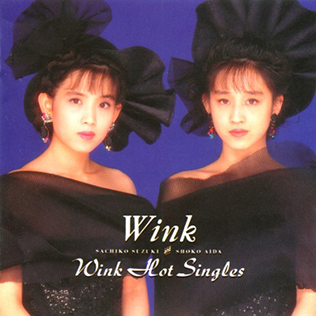Related Research Articles

Namie Amuro is a Japanese former recording artist, producer, dancer, model, actress and entrepreneur who was active between 1992 and 2018. A leading figure of the Japanese entertainment industry since the early 1990s, Amuro is known for breaking the youthful idol stereotype of J-Pop, changing the fashion trends and lifestyle of women in Japan, her experimentation across music styles, and for her visual imagery in music videos and live performances. Due to her career longevity, resilience, professionalism, efforts behind-the-scenes in the music industry, and her way of life, she is considered a pop culture icon in Japan and Asia. She has been referred to as "Diva of Heisei Era" and the "Queen of Japanese Pop", and has been recognized as having the influence and career impact domestically equivalent to artists such as Janet Jackson and Madonna in Western music and pop culture.
Toshinobu "Toshi" Kubota is a Japanese singer, songwriter, musician, music producer, and radio personality. He has produced six million-seller records and thirty-three Top 40 singles during his career. Kubota is currently part of Sony Music Japan. In addition, he has composed and written songs for many singers including Hiromi Iwasaki, Misia, Toshinori Yonekura, Kyōko Koizumi, and many other recording artists.

Greatest Hits is the eleventh official album release for English musician Elton John, and the first compilation. Released in November 1974, it spans the years 1970 to 1974, compiling ten of John's singles, with one track variation for releases in North America and for Europe and Australia. It topped the album chart in both the United States and the United Kingdom, staying at number one for ten consecutive weeks in the former nation and eleven weeks in the latter. In Canada, it was number one for 13 weeks between December 14, 1974, and March 22, 1975, missing only December 28, 1974, at number 2 to Jim Croce's Photographs & Memories.
Oricon Inc., established in 1999, is the holding company at the head of a Japanese corporate group that supplies statistics and information on music and the music industry in Japan and Western music. It started as Original Confidence Inc., which was founded by Sōkō Koike in November 1967 and became known for its music charts. Oricon Inc. was originally set up as a subsidiary of Original Confidence and took over the latter's Oricon record charts in April 2002.

Blue Blood is the second studio album by Japanese rock band X Japan, then known as simply X. It was released on April 21, 1989, by CBS/Sony as the band's major label debut. Blue Blood sold more than 700,000 copies, reached number 6 on the Oricon chart and stayed on the chart for more than 100 weeks. The album's singles would also reach the top five on the chart. In 2007, Rolling Stone Japan ranked Blue Blood number 15 on their list of the "100 Greatest Japanese Rock Albums of All Time".

"Sexy Music" is a single by Irish female vocal group The Nolans, from their 1980 album Making Waves. Released exclusively in Japan by Epic Records on March 21, 1981, the single was a commercial success, selling over 270,000 copies. The song also made the Nolans the first European act to win the Grand Prix at the Tokyo Music Festival

Kaikinetsu is the 17th studio album by Japanese singer-songwriter Miyuki Nakajima, released in November 1989. Like some of her previous efforts, it comprises the materials that she wrote for other singers.
Ann Lewis is a Japanese musician, popular in the 1970s and 1980s.
The Oricon Albums Chart is the Japanese music industry standard albums popularity chart issued daily, weekly, monthly and yearly by Oricon. Oricon originally published LP, CT, Cartridge and CD charts prior to the establishment of the Oricon Albums Chart on October 5, 1987. The Oricon Albums Chart's rankings are based on physical albums' sales.
The Oricon Singles Chart is the Japanese music industry-standard singles popularity chart issued daily, weekly, monthly and yearly by Oricon. Chart rankings are based on physical singles' sales. Until 2017, Oricon did not track download sales. In Japan, physical sales decreased sharply in the 2000s, while download sales hit three to four times the amount of single sales. In November 2017, Oricon introduced its first digital songs chart, separate from its main physical singles chart. On December 24, 2018, Oricon launched a streaming chart, and introduced a combined singles chart that utilizes physical single sales, downloads, and streams.

"Kuchibiru Kara Biyaku" is a song recorded by Japanese singer Shizuka Kudo for her fifth studio album, Rosette. It was released by Pony Canyon as the album's lead single on January 10, 1990. Although it was not officially released on vinyl, a few copies were produced for promotional use. Kudo performed the song on the 41st Kōhaku Uta Gassen, marking her third appearance on the program. In 2015, DAM asked their users to select their favorite Shizuka Kudo songs to sing karaoke to and compiled a top ten list; "Kuchibiru Kara Biyaku" came in at number six.

"Senryū no Shizuku" is a song recorded by Japanese singer Shizuka Kudo. It was released as a single through Pony Canyon on May 9, 1990. It marks the debut of Kudo as a songwriter. The song was featured on commercials for Taiyo Yuden That's cassette tapes. Similarly to her previous single, "Kuchibiru Kara Biyaku", a limited number of 7-inch vinyls of the single were produced for promotional use. "Senryū no Shizuku" has never appeared on an original album, but was included in the compilation album Unlimited (1990).

"Watashi ni Tsuite" is a song recorded by Japanese singer Shizuka Kudo. It was released as a single by Pony Canyon on September 21, 1990. The song made its first album appearance on the compilation album Unlimited, released that same year.

Wink Hot Singles is the first compilation album by Japanese idol duo Wink, released by Polystar on November 1, 1990. It covers the duo's singles from 1988 to 1990 and features a remix medley as the final track. A limited edition release included an 8 cm mini disc with two bonus tracks.

"Semi-sweet Magic" is the 18th single by Japanese entertainer Miho Nakayama. Written by Gorō Matsui and Cindy, the single was released on March 21, 1990, by King Records.
References
- ↑ "1990年 邦楽ヒット曲 ランキング". nendai-ryuukou.com. Retrieved 18 August 2016.